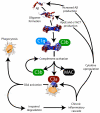Are NSAIDs useful to treat Alzheimer's disease or mild cognitive impairment?
- PMID: 20725517
- PMCID: PMC2912027
- DOI: 10.3389/fnagi.2010.00019
Are NSAIDs useful to treat Alzheimer's disease or mild cognitive impairment?
Abstract
Several epidemiological studies suggest that long-term use of non-steroidal anti-inflammatory drugs (NSAIDs) may protect subjects carrying one or more epsilon4 allele of the apolipoprotein E (APOE epsilon4) against the onset of Alzheimer's disease (AD). The biological mechanism of this protection is not completely understood and may involve the anti-inflammatory properties of NSAIDs or their ability of interfering with the beta-amyloid (Abeta) cascade. Unfortunately, long-term, placebo-controlled clinical trials with both non-selective and cyclooxygenase-2 (COX-2) selective inhibitors in mild-to-moderate AD patients produced negative results. A secondary prevention study with rofecoxib, a COX-2 selective inhibitor, in patients with mild cognitive impairment was also negative. A primary prevention study (ADAPT trial) of naproxen (a non-selective COX inhibitor) and celecoxib (a COX-2 selective inhibitor) in cognitively normal elderly subjects with a family history of AD was prematurely interrupted for safety reasons after a median period of treatment of 2 years. Although both drugs did not reduce the incidence of dementia after 2 years of treatment, a 4-year follow-up assessment surprisingly revealed that subjects previously exposed to naproxen were protected from the onset of AD by 67% compared to placebo. Thus, it could be hypothesized that the chronic use of NSAIDs may be beneficial only in the very early stages of the AD process in coincidence of initial Abeta deposition, microglia activation and consequent release of pro-inflammatory mediators. When the Abeta deposition process is already started, NSAIDs are no longer effective and may even be detrimental because of their inhibitory activity on chronically activated microglia that on long-term may mediate Abeta clearance. The research community should conduct long-term trials with NSAIDs in cognitively normal APOE epsilon4 carriers.
Keywords: Alzheimer's disease; microglia; non-steroidal anti-inflammatory drugs; β-amyloid.
Figures


References
-
- ADAPT Research, Group. Martin B. K., Szekely C., Brandt J., Piantadosi S., Breitner J. C., Craft S., Evans D., Green R., Mullan M. (2008). Cognitive function over time in the Alzheimer's Disease Anti-inflammatory Prevention Trial (ADAPT): results of a randomized, controlled trial of naproxen and celecoxib. Arch. Neurol. 65, 896–905 10.1001/archneur.2008.65.7.nct70006 - DOI - PMC - PubMed
-
- Aisen P. S., Davis K. L. (1994). Inflammatory mechanisms in Alzheimer's disease. Implications for therapy. Am. J. Psychiatr. 151, 1105–1113 - PubMed
-
- Aisen P. S., Davis K. L., Berg J. D., Schafer K., Campbell K., Thomas R. G., Weiner M. F., Farlow M. R., Sano M., Grundman M., Thal L. J. (2000). A randomized controlled trial of prednisone in Alzheimer's disease. Alzheimer's Disease Cooperative Study. Neurology 54, 588–593 - PubMed
LinkOut - more resources
Full Text Sources
Other Literature Sources
Research Materials
Miscellaneous

